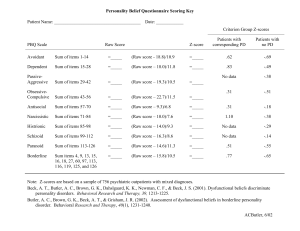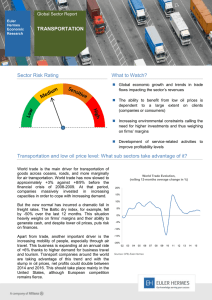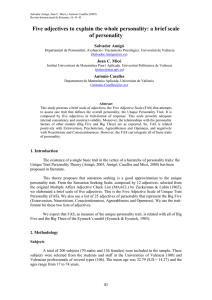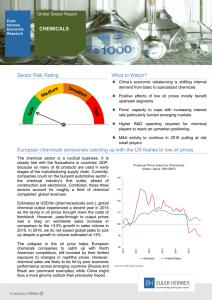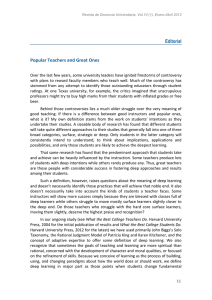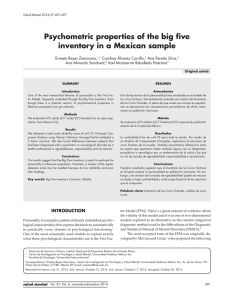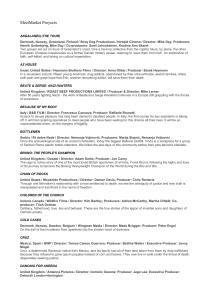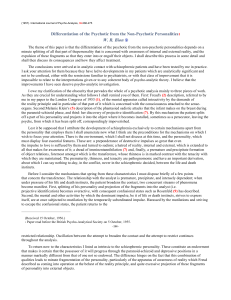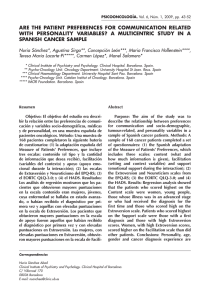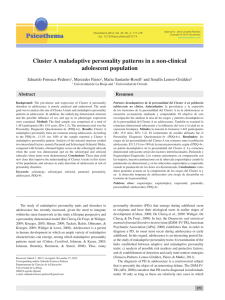Competition or Stagnation. - Distro of the Libertarian Left
Anuncio
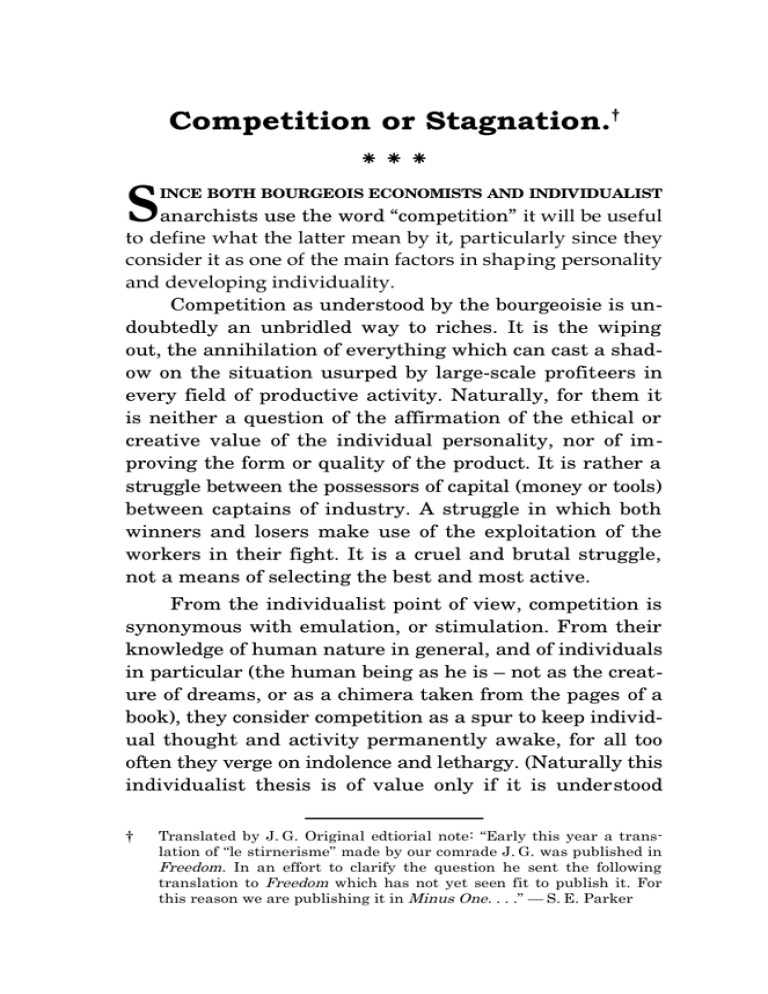
Competition or Stagnation.† ⁕⁕⁕ S INCE BOTH BOURGEOIS ECONOMISTS AND INDIVIDUALIST anarchists use the word “competition” it will be useful to define what the latter mean by it, particularly since they consider it as one of the main factors in shaping personality and developing individuality. Competition as understood by the bourgeoisie is un­ doubtedly an unbridled way to riches. It is the wiping out, the annihilation of everything which can cast a shad­ ow on the situation usurped by large­scale profiteers in every field of productive activity. Naturally, for them it is neither a question of the affirmation of the ethical or creative value of the individual personality, nor of im­ proving the form or quality of the product. It is rather a struggle between the possessors of capital (money or tools) between captains of industry. A struggle in which both winners and losers make use of the exploitation of the workers in their fight. It is a cruel and brutal struggle, not a means of selecting the best and most active. From the individualist point of view, competition is synonymous with emulation, or stimulation. From their knowledge of human nature in general, and of individuals in particular (the human being as he is – not as the creat­ ure of dreams, or as a chimera taken from the pages of a book), they consider competition as a spur to keep individ­ ual thought and activity permanently awake, for all too often they verge on indolence and lethargy. (Naturally this individualist thesis is of value only if it is understood † Translated by J. G. Original edtiorial note: “Early this year a translation of “le stirnerisme” made by our comrade J. G. was published in Freedom. In an effort to clarify the question he sent the following translation to Freedom which has not yet seen fit to publish it. For this reason we are publishing it in Minus One. . . .” — S. E. Parker that it excludes the domination of man by man.) For individualists, then, the expression “freedom of competition” means the complete possibility for individual affirmation in all fields. In other words, full opportunity for every individual, in association or alone, to present, diffuse, and put into practice all conceptions and methods with similar or differing aims, without any fear of restrict­ ive interference by a State, governmental administration, or any human being whatsoever. In the field of economic action freedom of competition means full opportunity for the producer – in association or alone – to develop his individual effort according to his taste. That is to say, to put into action his ingenuity, to call on his creativity and personal initiative, without the fear of clashing with a regulation which limits the conditions of his production. Individualists claim the same possibility for the con­ sumer to compare, choose or refuse – whether it concerns a thing of prime necessity which is offered to him, or a product of superior quality and refined manufacture. Any hindrance of this opportunity, or liberty, has as a result the increase of uniformity. Who says “uniform­ ity” says fossilization, regression, retrogression. In an environment in which there is no competition degradat­ ion results: the producer, instead of evolving towards the artist, devolves towards the labourer; the latter recedes into the automaton; and the consumer loses himself in fatuity and vulgarity. In all fields of activity or thought, the absence of com­ petition means the devolution of the work of art. It plunges the distinctive into the mediocre and the conscious into the unconscious. -2- The truth of this is proved by the evidence of the times in which we live, when competition is limited to a few private or State profiteers and privileged persons. The present state of human evolution is remarkable. The hu­ man species all over the world tends to be fed and clothed in the same way, and to live in houses constructed on the same model. They are on the way to thinking about all subjects in the same way and to accepting the same solutions to all of life’s problems. Unless there is a quick and vigorous reaction, distinctive personalities, original temperaments and inventive spirits will become except­ ions and abnormalities. The concentration of manufacture into the hands of a few, mass­production in immense industrial barracks, conscription and permanent armies – all these push the human personality towards the beast of the herd, making it into flesh for shepherds and dictators. The more the sequestration of production by profit­ eers, social administrators or the State, the more the regression of the workers towards machine­men is acceler­ ated, until they are only capable of guiding or watching an automatic mechanism produce always the same piece, the same part of an object. There is no similarity between competition, as under­ stood by individualists, and war. War is a struggle between rulers, monopolists, privileged industrial and political prof­ iteers, whose interests have nothing whatsoever to do with the development of personality, the affirmation of the individual. The state of war degrades man, making him merely an animated object whose being and having can be requisitioned at any time with no possibility of his resisting or protesting against the situation which is imposed on him. It is, therefore, contrary to competition. -3- The exercise of competition is a consequence of the limitation of population. Emulation is an illusion where there is overpopulation. Present­day society proves this superabundantly. It is no more than a fierce struggle of appetites and the need to satisfy them at any cost. A blind fight in which individual affirmation and the perfection of the product are the last consideration. The pity of it is that those who succumb, drowned in the flood of mediocrity, are frequently amongst the most gifted and original. Where it is a question of competition, or of no matter what other phenomenon of human life, the plan of the individualist anarchist remains the same: the maximum development of the individual, not of an elite of privileged persons of one kind or another. That is why individualists do not separate the exerc­ ise of competition from the opportunity for each individual, producer or consumer, to be able to learn, to know, to perfect himself, to dispose of the means of production, to publish, and to move freely. Any state of affairs, any individualist environment, which does not guarantee the individual equality of op­ portunity (and in certain circumstances does not renew such equality) is not favorable to competition. Without competition between groups, associations and individuals, it is difficult to avoid an open or hidden dicta­ torship, which invariably implies uniformity, conformity, and stagnation. ÉMILE ARMAND. TRANSLATION BY J. G. REPRINTED IN MINUS ONE # 5 (NOV. / DEC. 1964). 2–3. -4-
